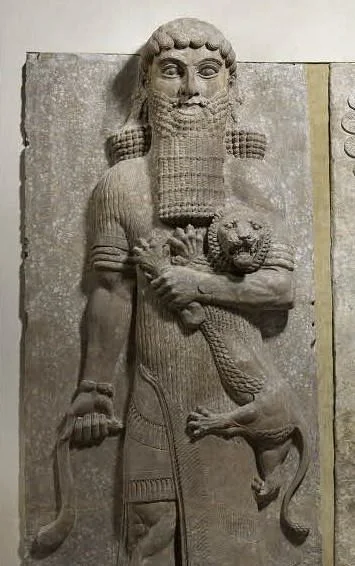Some people think of previous ages as less civilized than the age in which they live; they think of people from the past as being different from people today, less open-minded, somehow less "civilized". However, human psychology doesn't really change, it can be modified, but it remains substantially the same in any era. People in the past dressed differently than we do, they didn't have modern appliances, their weapons of war were not as destructive as ours, some people lived in terrible poverty, but the soul of these people is not different than our soul; people from the past share our human concerns, emotions, desires, joys and fears, prejudices and insights. All of this is a prelude to saying that The Epic of Gilgamesh has an almost contemporary quality to it, in some ways Gilgamesh and his friend Enkidu are people that could be alive today, they share our emotional life, they share our psychic/soul life.
When we first meet Gilgamesh —this epic was written 4000 years ago and Gilgamesh may have lived around 4000 years ago— Gilgamesh is living an
unreflected life; he is a ruler, both arrogant and powerful. We know that other people, his contemporaries, didn't approve of some of what he did; he is the king, the supreme leader, and it is mentioned that there is some disapproval of him because he took advantage of his position in society. But life changes, and psychological and spiritual change is often caused by suffering; suffering makes us think about our life, it makes us reflect on life. And this is the experience of Gilgamesh when his friend, Enkidu, dies; this is when Gilgamesh becomes more than a character in an ancient text.
It is suffering and his inability to deal with it that makes Gilgamesh "one of
us"; what is of interest for us in Gilgamesh’ s story is his psychology, his psyche, his soul, and his response to suffering. When his friend Enkidu dies Gilgamesh experiences grief and sorrow, he knows
the transience of life; he must reflect on the meaning of life when he is
thrown back on himself. Gilgamesh could have anything he wanted, he lived a privileged life, but he couldn't have eternal life, he couldn't escape the transience of life, he couldn’t bring Enkidu back to life. In his grief Gilgamesh searches for
meaning, and his search continues until he finds an explanation for his grief, until he finds meaning for his loss and how to deal with it.
In The Epic of Gilgamesh we are reading something that pertains to our own existence; indeed, this epic is a four thousand year old version of aspects of our own journey to a meaningful life. The subject of The Epic of Gilgamesh is the archaeology and healing of the soul.
30 March 2023; edited, November 2024; 19, 20 December 2024.
Post Script: I wrote, above, "Some people think of previous ages as less civilized than the age in which they live; they think of people from the past as being different from people today, less open-minded, somehow less 'civilized'. But perhaps it is the opposite, that we are less civilized than the people who lived in the past; if those who lived in the past knew about us they might be shocked at how low we have descended.
--20 September 2025


.JPG)